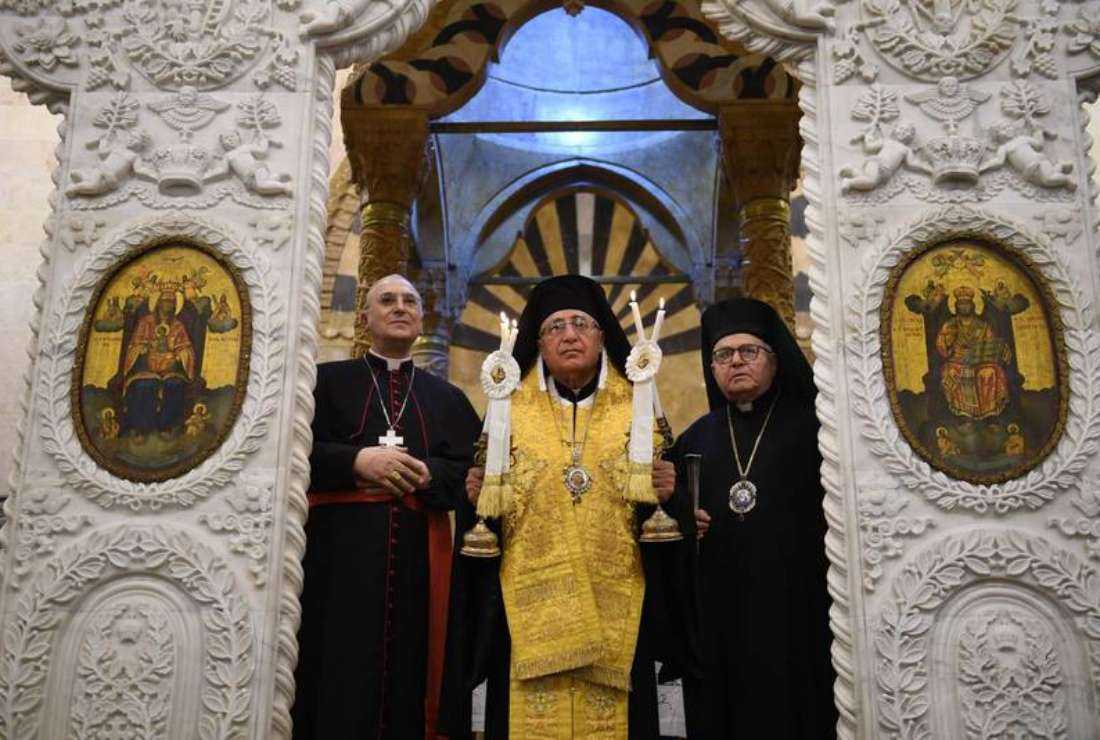
Patriarch of the Melkite Greek Catholic Church Youssef Al Absi, center, leads prayers during the re-opening of the Greek Catholic Church of Our Lady, in Aleppo in 2019. (Photo: AFP)
The Melkite Greek Catholic Church has announced a series of programs to mark 300 years of union with the Roman Catholic Church, terming the occasion a "sign of unity among all Christians."
Patriarch Yossef Absi of the Eastern-rite church made the announcement during a press conference in Raboué, Lebanon on July 11, Fides news agency reported.
The jubilee year is "a special time in which we are called to commemorate the 300th anniversary of the restoration of the full communion between the Melkite Church and the Church of Rome," Absi said.
The jubilee year's theme is "The Greek-Melkite Catholic Church: An ecumenical journey 1724-2024.”
Patriarch Absi said the anniversary year was an opportunity to reflect on the path of the Melkite Church and its mission.
It has the largest Catholic community in Syria and Israel, and the second largest in Lebanon.
"The synod of our church did not want this anniversary to pass without us reflecting on the past, present and future path of our church and her mission," Absi said.
According to Melkite Church sources, official celebrations will start in November in Damascus, Syria, with a liturgy presided over by Patriarch Absi in the Patriarchal Cathedral of Our Lady of the Dormition.
The jubilee year program includes liturgical celebrations, study conferences, publications, in-depth historical, theological, and ecumenical studies, and exhibitions on the spiritual and artistic heritage preserved by Melkite communities in the Middle East.
Recalling the history of the Church of Antioch, Absi acknowledged the theological disputes that divided the ecclesial communities.
The Roman Catholic Church (West) and the Byzantine Catholic Church (East), which included the Melkites, had long-standing disagreements over the use of unleavened bread for the sacrament of Communion, the exact wording of the Nicene Creed, and the celibacy of priests.
The "East-West Schism" or the "Schism of 1054" occurred when French cardinal, Humbert of Silva Candida, the-then papal legate, excommunicated Michael Cerularius, the Patriarch of Constantinople, from the Roman Catholic Church.
In retaliation, Cerularius convened a synod and excommunicated Pope Leo III and the entire Roman Catholic Church.
The split divided the Catholic Church into two factions — East and West — with each having its own distinct expressions of similar faith.
Absi said that efforts for reconciliation happened only in the 17th century through Western Catholic missionaries.
He added that the missionaries "sought to heal the breach and achieve the desired unity between the Patriarchate of Antioch and the Church of Rome."
This effort grew into a "reunification movement" which, along with other crucial factors, led to other divisions within the Church of Antioch itself, the prelate added.
"Since 1724, we have the Melkite Greek Catholic Church and the Greek Orthodox Church," Absi said, pointing out that every split within the Church had left its mark and led to painful tensions.
Absi noted that the Catholic churches in the East have still preserved their faith despite all the challenges and pain that they faced.
"But despite all this, the churches of Antioch have fulfilled their mission of preserving the Christian faith and have overcome all the critical moments they have lived through," Absi said.
He pointed out that the relationship between the churches in the East and West continues to flourish and bear witness to the teachings of the Gospel.
"The relationships between our church and sister churches continue to be one of mutual respect, brotherly love and collaboration in the service of the one gospel," Absi said.
He added that through the collaboration of churches in the region, the "faithful often have a privileged experience of gathering under the roof of the same house from different denominations to bear a clear testimony of their belonging to Christ."
According to 2017 figures by the Holy See, there are more than 425,000 Greek Melkite Catholics in Lebanon, around 235,000 in Syria, around 27,600 in Jordan, and around 80,000 in Israel and Palestine.


